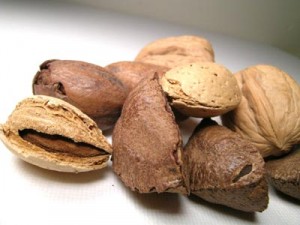
More evidence that low-calorie sweeteners are bad for your health
Studies show that artificial sweeteners can raise the risk of hypertension, metabolic syndrome, type 2 diabetes and heart disease, including stroke.

Natural Health News — Two studies have reaffirmed the benefits of including tree nuts – almonds, Brazil nuts, cashews, hazelnuts, macadamias, pecans, pine nuts, pistachios and walnuts – as part of a healthy diet.
In the first published in Nutrition Research, researchers looked at links between tree nut consumption with nutrient intake, diet quality and disease in 24,385 children and adults. Nut eaters had higher intakes of energy, monounsaturated and polyunsaturated fats (the good fats) and dietary fibre, and lower intakes of carbohydrates, cholesterol and sodium than those who did not eat nuts.
Adult nut-eaters also had a 19% decreased risk of hypertension and a 21% decreased risk of low high-density lipoprotein (HDL-the good cholesterol) levels – both risk factors for metabolic syndrome and heart disease.
For this study nut consumption was defined as at least ¼ ounce of nuts per day, solely as nuts and not as part of products (i.e. in breads, cereals and bars).
This study follows one published earlier this year in the Journal of the American College of Nutrition, in which researchers compared risk factors for heart disease, type 2 diabetes and metabolic syndrome of nut consumers versus those who did not consume nuts in 13, 292 adult (age 19 and over) tree nut eaters. Those who ate at least ¼ ounce of nuts per day had lower body weight, higher levels of high-density lipoprotein-cholesterol (good cholesterol) and lower levels of C-reactive protein, an indication for inflammation which can lead to a variety of chronic diseases including heart disease.
Reducing health risks
Tree nut consumption was associated with a 5% lower prevalence of metabolic syndrome, a name for a group of risk factors that occur together and increase the risk for coronary artery disease, stroke and type 2 diabetes. In addition, tree nut consumers had a lower prevalence of four risk factors for metabolic syndrome: abdominal obesity, high blood pressure, high fasting glucose (blood sugar) levels and low high-density lipoprotein-cholesterol levels.
It’s worth noting that these study was funded by the non-profit International Tree Nut Council Nutrition Research & Education Foundation. However this does not detract from the yeas of studies showing nuts are a healthful addition to our daily diets.
In many western countries nut consumption is relatively low perhaps due to fears that nuts are high calorie/high fat snacks. However the fats found in nuts are generally healthy fats and on the basis of nuts’ healthy qualities the US Food and Drug Administration (FDA) has recently issued a qualified health claim for nuts and heart disease with a recommended intake of 1.5 ounces of nuts per day.
They key say both studies is to eat nuts in their natural state and not as part of a highly processed snack food. So grab a handful of nuts as a snack every day, or throw some on yoghurt, salad or oatmeal to get the most benefits.

Please subscribe me to your newsletter mailing list. I have read the
privacy statement